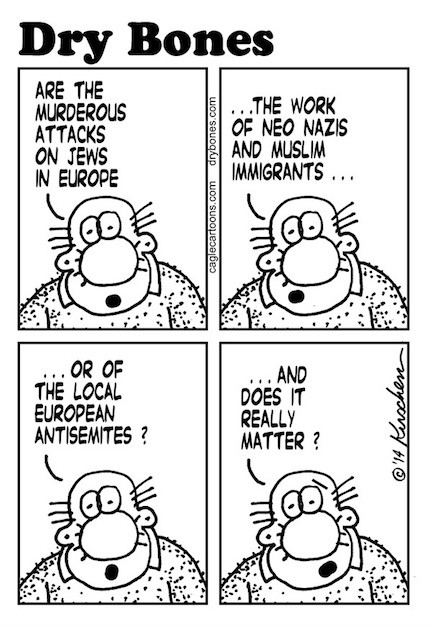Thank Haaretz for its anti-‘occupation’ stand?
When a newspaper long perceived to align with a particular political slant is actually transparent about that slant, does it say anything new about the paper?
That is among the questions posed by a recent appeal from the publisher of Haaretz for more English-language subscribers. In a May 12 post titled “An open letter from the publisher: Subscribe to Haaretz and help shape Israel,” Haaretz Publisher Amos Schocken wrote that by subscribing to the newspaper, one can “become a partner in actively supporting the two-state solution and the right to Palestinian self-determination, which will enable Israel to rid itself of the burdens of territorial occupation and the control of another people.”
Taking this public political stance was deemed necessary by the newspaper “because the relations between us Israelis and the Palestinians, the Israeli occupation of the territories, is the single most crucial issue for Israel,” Schocken told JNS.org.
“As Secretary of State [John] Kerry said, Israel may become an apartheid state, if this issue is not solved in a way that will result in two states, or else the Zionist goal of self-determination for the Jews will be compromised,” the publisher added, echoing controversial remarks Kerry made in April.
The wording of Schocken’s May 12 letter is markedly different from a November 2011 letter obtained by JNS.org in which he also appeals for subscribers. In that letter, there was no stance taken on the Israeli-Palestinian conflict, nor indeed any mention of the conflict. Potential subscribers were simply told that they could become “part of the greater digital community of Haaretz readers who believe that free speech, unvarnished information and speaking truth to power are an integral part of the core resilience of Israeli democracy.”
Tamar Sternthal, director of the Israel Office of the Committee for Accuracy in Middle East Reporting in America (CAMERA), criticizes Haaretz’s new strategy of marketing directly to readers on one end of the political spectrum.
“While it is legitimate for a newspaper to express its prevailing political views in its editorials, professional journalistic guidelines call for a separation of news and views. Once a media outlet engages in advocacy journalism, and allows a particular political agenda to color its news reports, it is no longer being faithful to the core journalism imperative to report the truth,” she told JNS.org.
Yet Eric Alterman—a journalism professor, media columnist, and fellow at the Center for American Progress (CAP)—believes the perception that news reporting needs to be separate from political views is not as common outside the U.S., and that American newspapers “are [also] becoming more transparent about the conclusions that are implied by their reporting.”
“This is Haaretz’s political viewpoint. I appreciate their honesty,” Alterman, author of “The Cause: The Fight For American Liberalism,” told JNS.org regarding Schocken’s letter.
There is also a big difference between the political debate about Israel in Israel itself, and the discourse about the Jewish state in the U.S., noted Georgetown University professor and Middle East analyst Moran Stern.
“In the U.S. it seems that there is a clear—somewhat superficial—division between left and right, between pro-Israel and anti-Israel, and in Israel that is not really the case,” Stern told JNS.org.
Yet while Haaretz “is a product of Israel’s vibrant democracy and press freedom, it also plays a major role in the demonization of Israel,” wrote Simon Plosker, managing editor for the website of the media watchdog group HonestReporting. Plosker cited the “hateful writing” of Haaretz columnist Gideon Levy, who won HonestReporting’s 2012 “Dishonest Reporter Award” for “manipulating an opinion poll to ‘prove’ that Israel was an apartheid state,” and the work of correspondent Amira Hass, who “brazenly defended Palestinian stone throwing even if it could cause Israeli fatalities.”
“Schocken’s mission statement is also noteworthy by what it omits,” Plosker wrote. “While he is happy to employ positive terms such as ‘liberal,’ ‘pluralism,’ and ‘civil and human rights,’ what about ‘Jewish?’ This speaks volumes for a media outlet that often looks like it is embarrassed by Israel’s identity as a Jewish and democratic state.”
CAMERA’s Sternthal, who regularly monitors both the Hebrew and English print editions of Haaretz, points to what she sees as a pronounced difference between Haaretz’s Hebrew and English non-opinion news reporting. Most Haaretz stories are written first in Hebrew, then translated for the English edition—and Sternthal believes more than translation is going on.
“In preparation for the English edition, the Hebrew articles are not merely translated—they’re often also whitewashed,” she said.
Sometimes in a dramatic fashion, and other times subtly, information that first appeared in the Haaretz Hebrew edition regarding Palestinian or Arab terrorism, extremism or other wrongdoing is either downplayed or omitted entirely, at times to the point of being completely at odds with the original Hebrew text.
One of the most recent examples of this “Lost in Translation” phenomenon is the Haaretz English article “Lag Ba’Omer in Hebron: Settlers torch Palestinian orchard,” whose headline is not corroborated by the facts in the rest of the story, CAMERA noted.
The article itself did not support the “torching” claim in the headline, and the headline of the article’s Hebrew version did not use the same erroneous wording. Haaretz later corrected the headline of the English piece to “Lag Ba’Omer in Hebron: Settlers light bonfire in Palestinian orchard.”
In another incident earlier this month, Haaretz reported on Israeli Prime Minister Benjamin Netanyahu’s statement concerning Israel as “the nation-state of one people only—the Jewish people” by using the English headline “Netanyahu: Israel is home to one people—Jewish.”
CAMERA’s report on that article stated that “the difference between an exclusively Jewish ‘home’ and an exclusively Jewish ‘nation-state’ is vast.”
“If Netanyahu said Israel is ‘home’ only to the Jewish people, then he was indicating that 20 percent of Israel’s population… are not welcome… In fact, the prime minister explicitly affirmed that Israel ‘provides full equal rights, individual rights, to all its citizens,’” CAMERA said.
Haaretz also corrected that headline in both print and online, and issued a formal correction statement.

 65.0°,
Overcast
65.0°,
Overcast 







